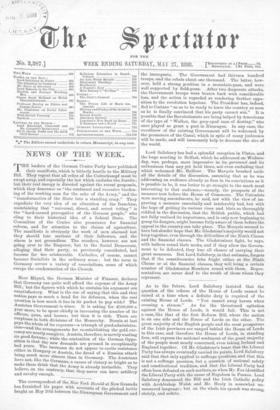As to the future, Lord Salisbury insisted that the question
of the reform of the House of Lords cannot be raised at a time when a definite duty is required of the existing House of Lords. "You cannot swap horses when crossing a stream." As for the threatened agitation against the House of Lords, it would fail. This is not a case, like that of the first Reform Bill, where the nation is on one side and the House of Lords on the other. The great majority of the English people and the most prosperous of the Irish provinces are ranged behind the House of Lords in this case, and therefore the House of Lords, in standing firm, will express the national sentiment of the great majority of the people most nearly concerned, even taking Ireland and England together. Of Mr. Gladstone's boast that the Liberal Party has always eventually can-led its points, Lord Salisbury said that that only applied to suffrage questions, and that this is not a suffrage question, but a question of national safety and constitutional tradition, and that the Liberal Party had often been defeated on such matters, as when Mr. Fox identified the Liberal Party with the cause of Napoleon in France. Lord Salisbury denounced the Bill and the Irish Catholic policy with Archbishop Walsh and Mr. Healy in somewhat un- measured language ; but on the whole his speech was strong, stately, and sedate.


































